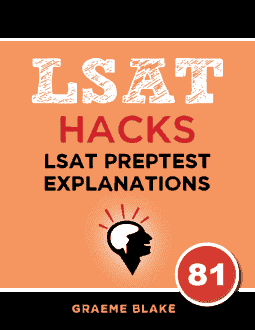QUESTION TEXT: Film historians often find it difficult to determine…
QUESTION TYPE: Most Strongly Supported
CONCLUSION: Film historians tend to find it hard to figure out how audiences reacted to films, especially early 20th century films.
FACTS:
- Box office sales just show how well a film did financially. It doesn’t show what was funny, frightening, moving etc.
- The historians say that newspaper and magazine reviews also don’t provide much insight [into audience members’ views]
ANALYSIS: This is a somewhat different most strongly supported question. For two reasons:
- It has a conclusion. The first sentence is supported by the next two facts
- You don’t have to combine the facts to make a deduction. Instead, you only have to read the two facts in terms of what the conclusion is talking about.
The conclusion is talking about “figuring out audience members’ views”. So, when the final sentence says “does not provide much insight” it means much insight into audience members’ views. I added that in brackets.
You may have realized this when reading, but then lost the deduction when looking through the answers. The tentmakers put the right answer far down the answers, and I don’t think this was an accident. On this type of question they’re trying to lose you in the details.
So, this is a bit like a logic game. As soon as you make a deduction not explicitly stated in the stimulus, take note of it immediately. This deduction is something supported but not explicitly stated by the stimulus: it’s what this question type asks for. You have to retain that deduction and keep it with you while looking through the answers, and don’t let the test makers let you lose it with distractions.
___________
- Careful. This is a possible reason why reviews wouldn’t be helpful, but it doesn’t have any support from the stimulus. The stimulus says nothing about when reviews are written.
- This contradicts the first sentence. That sentence is talking about all films. It says it’s especially hard with early 20th century films, but the word “often” applies to every film, not just 20th century ones.
(“Particular films” is the grammatical object of the sentence – that’s what film historians find difficult to determine audience members’ reaction to.) - This goes too far. Success might depend on those factors. The problem is, you can’t work backwards from success and say which of the emotions the audience felt. And also, failure wouldn’t mean lack of those emotions. The historians are not only concerned with understanding audience reactions to successes.
All we can reasonably say is: “financial success or failure does not let us definitively figure out an audience’s emotional reaction to a film” - CORRECT. This must be true. The final sentence says historians do not think that reviews provide “much insight”. Insight into what? The stimulus is about figuring out audience reactions. So, the sentence must mean “does not provide much insight [into audience reactions]”
- This is unlikely. If reviews were uncommon, historians would have said “and unfortunately, reviews were uncommon”. Instead, it seems likely that reviews existed, but historians didn’t find helpful.
You should always strive to give LSAT sentences their most straightforward meaning. If historians meant “we can’t find reviews”, they would say that directly.


Graeme- Couldn’t “much insight” from the stimulus be translated to “some insight”? If the critic believes there is some insight, then wouldn’t that contradict answer choice D?
No. Fails to provide much insight sets a *cap* on how much insight there is. Say, no more than….uh, 15% of the insight you’d normally want? Point being the range is 0-15%. Fails to provide much insight is consistent with no insight. Or such little insight that you can’t really determine a typical view from them.